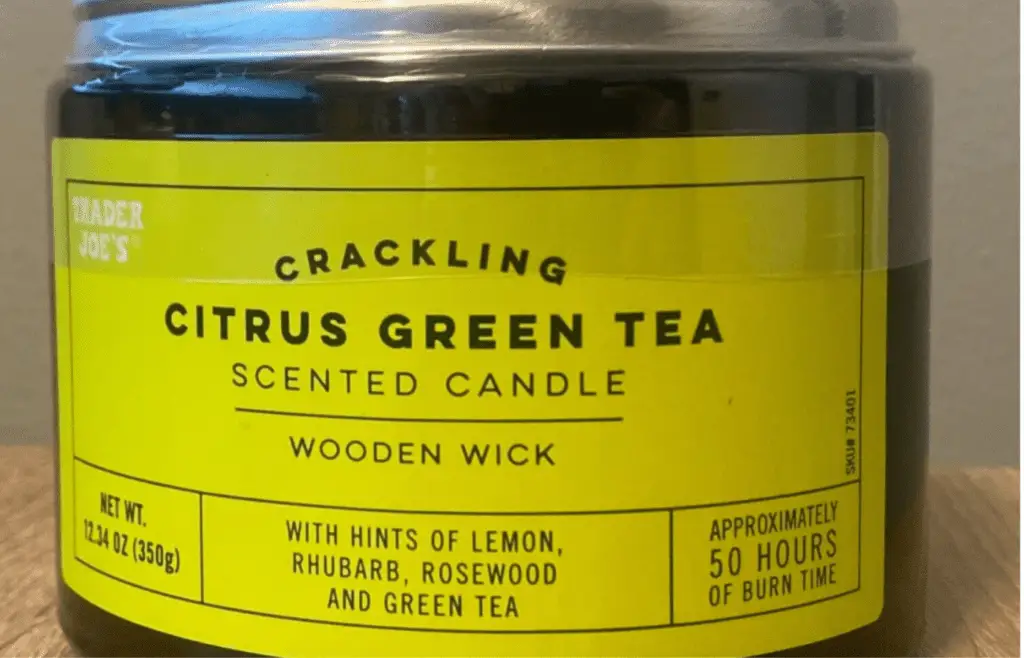Headlines abound these days about candles being toxic, but what does that even mean? Are Trader Joe’s candles toxic too?
Candles made from paraffin wax slightly expel formaldehyde, a cancer-causing toxin, into the air. Because of this research, soy and beeswax candles are much safer to burn. Soy wax still emits volatile organic compounds, but not as much as paraffin. Trader Joe’s candles are less toxic because they mostly use soy wax and beeswax.
Candles may make us smile, but some might not be healthy to burn! This article will dive in to discover the truth behind Trader Joe’s candles and candle toxicity. So let’s get started!
Are Trader Joe’s Candles Toxic?
The candle industry is a popular one. For some people, it wouldn’t be home without the soft glow of a candle and the faint scent of evergreen filling the air.
However, you should hold off on lighting that evergreen-scented candle until you know what’s inside it.
No matter what type of candle you burn in your home, it will affect your air quality. That comes with the territory of owning a candle.
You can purchase safer alternatives, like Trader Joe’s candles, to avoid potentially risky toxins. Trader Joe’s candles are much less toxic than others because they don’t use paraffin wax.
To check the current price and availability of Trader Joe’s candles, click here to view the selection on Amazon.
What Makes A Candle Toxic?
The discussion about toxic candles dates back to 2001 when a report released by the Environmental Pollution Agency stated that some candles led to a certain degree of air pollution.
The air pollution was caused by candles made with lead wicks, banned in 2003, and any candle that released formaldehyde.
Candles made from paraffin wax expel volatile organic compounds when burning, such as formaldehyde, toluene, and benzene.
Paraffin wax is a common candle-making ingredient that comes from petroleum, coal, or oil shale. These candles burn brighter and more reliably than other types but emit more toxins.
However, research about toxins and candles is vague and disagreeable. Some sources claim most candles are toxic, while others state that they are hardly harmful.
A New York Times article discusses a study comparing the air quality of different-sized rooms burning potentially toxic candles for 4 hours straight.
The study concluded that the room’s air quality was hardly affected, making it safe for consumers to burn any candle they desire.
But these studies are still inconclusive. Candle companies have no regulations that force them to label what is inside their products.
Thus, if you want to err on the side of caution, go with a soy or beeswax candle from a reliable company like Trader Joe’s.
What Are Trader Joe’s Candles Made of?

Trader Joe’s makes their candles from a coconut-soy wax blend with a hint of palm and beeswax.
Following the lead wick ban of 2001, Trader Joe’s makes their candles with lead-free cotton wicks.
Are All of Trader Joe’s Candles Non-Toxic?
Most research on candles and toxins showed that soy wax burns cleaner than paraffin wax. Since soy wax is one of the main ingredients of most Trader Joe’s candles, they are significantly less toxic than others.
Trader Joe’s also utilizes beeswax in their candles. Out of all the research on candles and air quality, beeswax always came out on top for burning cleanest- even above soy, making it the safest wax. The extra bit of beeswax in a Trader Joe’s candle may make the candle safer.
However, it might be a stretch to say that all Trader Joe’s candles are non-toxic. Soy candles still emit a small amount of volatile organic compounds. The artificial fragrances inside the candles may also release some unhealthy substances into
the air.
The company has been creating more beeswax and fewer soy-based candles, so if you’re out shopping for a non-toxic candle at Trader Joe’s, keep an eye out for beeswax!
Are Trader Joe’s Candles Pet Safe?
The type of wax used in a candle will not greatly affect your pet’s health. However, other ingredients might. Dogs have better senses of smell than we do, meaning they are more sensitive to certain scents and chemicals.
Essential oils are especially unsafe for your pet. The most harmful ones are tea tree, peppermint, cinnamon, pine, wintergreen, citrus, and sweet birch. These oils have caused liver problems and nervous system damage in dogs.
Irritation in the nose, mouth, and throat can also occur when candles lit with these scents are near your furry friend.
Trader Joe’s candles are pet safe because they do not utilize essential oils. If you want to be on the safe side, choose scents that are not overpowering to keep your pet happy and healthy.
Which Candles Are Non-Toxic?
Candles made from beeswax, coconut, or soy are considered less toxic or non-toxic. Choosing a candle that derives its scent from natural ingredients instead of artificial fragrances is safer.
Aside from Trader Joe’s, here are some other companies that are known for their non-toxic candles:
Grow Fragrance – A blend of coconut oil and soy wax with 100% plant-based ingredients, including essential oils. It comes in a reusable concrete jar with a refillable/recyclable insert.
Terralite – Coconut wax and essential oils.
Slow North Candles – United States soy wax with essential oils.
Life in Lilac – A blend of soy and coconut waxes with naturally derived ingredients, like essential oils.
Pure Plant Home Candles – Coconut wax and essential oils.
Sanari Candles – Mostly coconut wax with a little soy and essential oils.
Final Thoughts
Transparency is key when candle shopping. While there are no laws requiring candle makers to list the ingredients and wax types, you should look for the ones that document these things- because they’re likely far more trustworthy.
While research and opinions vary drastically on how toxic candles are for you, avoiding companies that use paraffin wax is a good idea. Instead, choose soy or beeswax-based candles for healthier air quality.
Trader Joe’s uses soy and beeswax blends to make their candles less toxic. They’ve recently turned to more beeswax in their ingredients to make them even more non-toxic!


